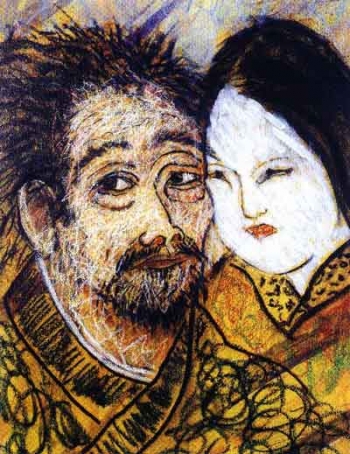 Ikkyu in love: Artwork depicting the poet's love of women. From Sassistas.com.
Ikkyu in love: Artwork depicting the poet's love of women. From Sassistas.com.Dr. Andrew K. Whitehead is Assistant Professor of Philosophy in the Department of History and Philosophy at Kennesaw State University in Atlanta USA. He specializes in East-West comparative philosophy, particularly concerning the philosophy of Zen Buddhism and Phenomenology. His most recent publications include Landscape and Travelling East and West: A Philosophical Journey (co-edited with Hans-Georg Moeller, Bloomsbury Academic, 2014), which includes his article "Hōben as Pedagogical Landscape," and "Sex and a Drinking Song: The Ethics of Ikkyū Sōjun" (Comparative and Continental Philosophy, Vol. 5 No. 2, 2013). He was the inaugural manager of the Irish Institute of Japanese Studies from 2011 until 2014.
Ikkyū Sōjun (1394-1481) remains one of the most celebrated, but also least examined or understood Zen monks of medieval Japan. He is referred to as ‘Crazy-Cloud’, ‘Blind Donkey’, ‘Dream Chamber’, and several other sobriquets.
Those who are fortunate enough to come across some of his poetry and prose cannot help but feel drawn to this eccentric and seemingly uncouth master. Yanagida Seizan once wrote that “to speak of Ikkyū is really to speak of oneself,” and went further in his Ikkyū no shisho to sono shogai (The life and thought of Ikkyū), asking: “is he not perhaps the only one of a kind in the history of Buddhism through India, China, and Japan?” The late R.H. Blyth called Ikkyū “the most remarkable monk in the history of Japanese Buddhism, the only Japanese comparable to the great Chinese Zen masters.” Yet Ikkyū's authoritative position in the lineage is confused and, consequently, overlooked as a result of the fact that he was passed over as dharma-heir in favour of his “nemesis” Yoso Soi. His subsequent cultural avatar and historiological figure have proven equally problematic.
In the 1980s, he became famous in Japan through comics and an animated television series depicting him as a young adept; a ‘rascal’ who outwits his teachers and peers in eccentric and unexpected ways. This historiological transfiguration no doubt stems from how little is known about the actual history of the person of Ikkyū. With this in mind, I am inclined to agree with Heinrich Dumoulin, who concluded that Ikkyū's life consists of a series of puzzles.
The records inform us that Ikkyū was the illegitimate son of the Emperor Go-Komatsu, and that his mother was exiled from the court while pregnant with her bastard child. For the first several years, she raised him in impoverished conditions until he was entrusted to the local temple at age five. His education in Zen is traced to the poet-monk Botetsu of Kennin-ji, the hermit-monk Ken-ō of the Myōshin-ji line, and the abbot of Daitoku-ji, Kasō Sōdon. It was Kasō who eventually confirmed Ikkyū’s enlightenment, bestowing him his inka (certificate of enlightenment), though Ikkyū was reluctant to accept it. In fact, he is recorded to have thrown it in the fire.
The influence of all three masters is clear. For thirty years following the death of Kasō, Ikkyū assumed the role of a wandering monk, moving mainly between Kyōto, Osaka and Sakai, living outside of the monasteries, befriending all classes of society without discriminating among them. He is said to have been an enemy of hypocrisy; and it is said that his complaints about the degeneracy of his fellow monks was a means by which to exert himself on behalf of lay Buddhism.
Ikkyū is now perhaps best remembered for his outrageous behaviour and seemingly very non-Buddhist lifestyle. He is depicted (and unabashedly depicts himself) as a lover of meat, of sake, and of women. These depictions tell of his regular frequenting of brothels, and describe in crude and even simple language various sexual acts, both communal and individual. Late in his life, Ikkyū developed a relationship with a young blind Buddhist nun named Mori, and subsequently produced some of his most famous poetry, most of which is romantic or sexual in nature. In many ways, Ikkyū came to identify Mori with Spring, with rejuvenation, and with possibility. He simultaneously intensified his attacks on his contemporaries, abhorring their lack of commitment and failures to understand the dharma.
In his final years, Ikkyū was made abbot of Daitoku-ji, which he had helped restore following the Ōnin war, though he spent most of his time at a hermitage his disciples had built for him (Shūon-an) at the monastery of Myōshō-ji following his restoration of this commemorative institution. He died there at the age of 87. Of course, the character Ikkyū has not died: Jon Carter Covell finds that he has instead “become a legend and a folk hero … his real life characteristics exaggerated and misunderstood.”
Even in this exaggerated and misunderstood form, however, it remains possible to get to the heart of Ikkyū’s life and works. All it takes is sensitivity. It requires sensitivity to the historical emergence of the school of Zen to which he belonged and to the cultural situation in which he found himself. Approaching Ikkyū in this way allows one to join him in his non-dualist worldview. It invites one to understand his position that eccentricities are non-eccentric, and that dualist value systems are ultimately undermined by the Buddhist worldview. These “boundaries” are always shifting according to narrow and limited perspectives. Poem number 254 of the Kyōunshū (the so-called ‘Crazy Cloud Anthology’), “A Rakan Plays in a Brothel Unexpectedly”, reads:
A Rakan comes out of the dust, no discrimination no desire.
A brothel’s diversions and play, much desire.
What is the boundary of bad? What is the boundary of good?
The monk’s craft, Demon or Buddha desire?
Free from essential binary value structures, approach Ikkyū and his craft patiently, carefully, and enjoy.















